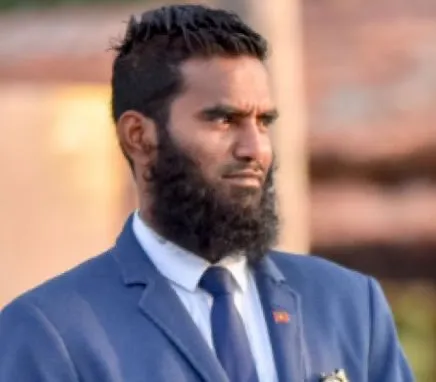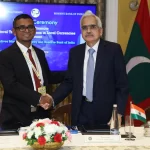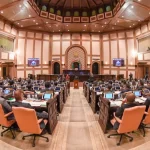Malé, Maldives — In a surprising career move that has raised eyebrows among both his fans and political observers, Ali Ashfaq, the beloved football legend known as the “Man of Steel,” Dhangandey has been appointed as Director General at the Speaker’s Mansion. The position marks an unexpected shift for Ashfaq, widely regarded as one of the best footballers in South Asian history, who has now taken on a significant administrative housekeeping role in Maldivian politics.
Ashfaq’s appointment is generating a mixed response in the Maldives, where his prowess on the football pitch has made him a household name and a symbol of national pride. Known for his clinical finishing and record-breaking goal-scoring ability, Ashfaq’s transition from sports to a hospitality management role reflects a distinct shift. Earlier in Asia and elsewhere we have seen sports stars have leveraged their fame to enter the political arena. However, Ashfaq’s fans are puzzled by his decision to accept a role that seems less impactful than his previous leadership as the captain of the Maldivian national football team.
“Stop exploiting respected public figures to gain power, as it will only lead to a loss of respect for them. Let them be remembered with dignity for the betterment of our society,” a Twitter user lamented, echoing a sentiment shared by many Maldivians who believe Ashfaq’s legacy could be at risk.
The trajectory from sports to politics is seen earlier in Asia. Indian football great Baichung Bhutia formed his own political party and contested elections in his home state of Sikkim. In Georgia, former AC Milan star Kakha Kaladze successfully transitioned to politics, eventually becoming the Mayor of Tbilisi. Similarly, Iran’s Ali Daei, renowned for his record as international football’s top goal-scorer, served a term in Iran’s parliament. While these figures have taken on roles that directly impact policy and governance, Ashfaq’s new position, which is more administrative in nature, has led to questions about its significance.
Ashfaq’s move also comes amid a time of heightened economic tension in the Maldives. The nation’s economy, currently facing volatility, is in need of revitalization. Observers are left wondering whether Ashfaq’s new role signals a deeper engagement with Maldivian politics or a strategic positioning by political players seeking to capitalize on his widespread popularity.
Despite the skepticism, Ashfaq’s legacy as a footballer remains untarnished. From his early days at Club Valencia to his triumphs with the Maldivian national team, where he led the country to its first SAFF Championship title in 2008, Ashfaq has cemented his status as a sporting icon. His impact goes beyond accolades, inspiring a generation of young Maldivians to dream big both on and off the field.
For now, Maldivians and football fans alike will be watching closely to see how Ashfaq navigates his new role. Whether this appointment will mark the beginning of a significant political career or remain a brief detour in the life of a national hero remains to be seen.












